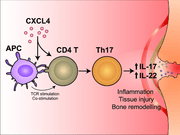Emerging research has shown increased levels of CXCL4, previously known as platelet factor 4, in various forms of T helper 17 (Th17) T cell associated rheumatic diseases. However, the exact role of CXCL4 during pathogenesis and how it contributes to Th17 driven pathology is not well characterised.
Th17 cells are CD4+ T cells that secrete cytokines such as IL-17 and IL-22, that play an important role against pathogen clearance particularly during fungal infection. Th17 cells are also well known to contribute to pathogenesis during autoinflammatory diseases such as Psoriasis, Psoriatic arthritis, lupus and rheumatoid arthritis. Th17 cells contribute to pathology by secreting IL-17, which play a destructive role in by inducing tissue inflammation, destruction and bone erosion.
Researchers, Affandi et al., aimed to determine the direct and indirect effects of CXCL4 on Th17 cells..They performed non-specific stimulation experiments of ex-vivo peripheral blood mononuclear cells (PBMC) in the presence and absence of CXCL4, to illustrate direct effect of CXCL4 on CD4 T cells. Using these experiments, they demonstrated significant induction of IL-17 as well as Th17 cells that co-express IFN-γ and IL-22 in the presence of CXCL4 . Additionally, they showed that CXCL4 indirectly contributes to enhanced Th17 activation via monocyte derived dendritic cells (DCs) but not plasmacytoid DCs and B cells. Finally, using samples from individuals suffering from Psoriasis and Psoriatic arthritis, they demonstrated that CXCL4 positively correlated with increased levels of Th17-associated cytokines at the site of infection.
In summary, Affandi et al., showed that CXCL4 directly and indirectly promotes Th17 cells during Psoriasis and Psoriatic arthritis. They definitively, showed that CXCL4 induces Th17 and Th17-associated (IFN-γ and IL-22) cytokine expression but not Th2 associated cytokine IL-4. CXCL4 is a pro-inflammatory cytokine, thus by modulating antigen-presenting function by promote inflammatory environments which result in increase in IL-17, resulting in detrimental effects.
Journal Article: Affandi et al., 2018. CXCL4 is a novel inducer of human Th17 cells and correlates with IL-17 and IL-22 in psoriatic arthritis. European Journal of Immunology.
Journal Article by Cheleka AM Mpande












